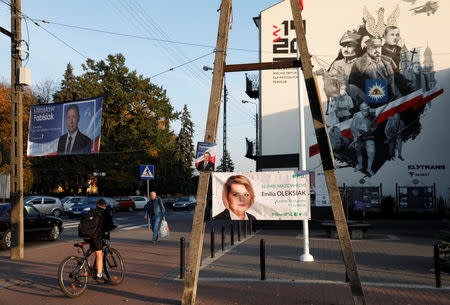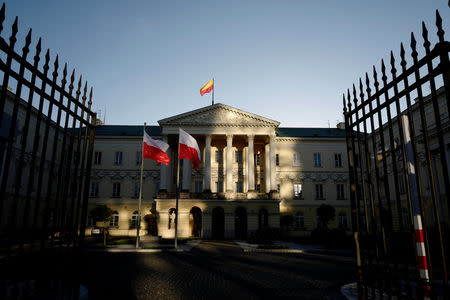Polish regional vote a test for eurosceptic PiS government
By Pawel Florkiewicz and Pawel Sobczak
WARSAW (Reuters) - Poles vote in a regional election on Sunday with gains expected for the ruling Law and Justice (PiS) party, whose nationalist rhetoric and institutional reforms have put the country at loggerheads with the European Union.
PiS swept into power in 2015 on a promise of voter-pleasing welfare reforms, social conservatism and a bigger state role in the economy. The party remains broadly popular, despite accusations at home and abroad of a shift towards authoritarian rule.
The election is part of a larger struggle over Europe's future, as Brexit and Hungary's Viktor Orban - who like the PiS believes the EU's powers should be reined in - shake up the bloc and right-wing parties make gains across the continent.
While it dominates national politics, PiS controls only a small minority of city halls, and has a majority in only one provincial assembly out of 16.
If successful in gaining seats, PiS will have better access to local funding, a factor that could affect parliamentary elections in 2019. It will also have more influence over schools and theatres, important tools in the party's nationalist agenda.
PiS opposes abortion, contraception and IVF fertility treatment and wants culture and education to be more conservative.
At two polling stations in Warsaw, early turnout appeared modest, but voters were expected in greater numbers after church services ended.
PiS supporter Urszula, 68, who cast her ballot early, said: "It is important that those who rule locally help those who are in the government, so that their effect is bigger."
A spike in PiS support in cities, traditionally centrist strongholds, would show its brand of populism gaining broader appeal and would be a major upset for the Civic Platform, the home party of European Council President Donald Tusk.
Opinion polls show PiS could win 33-37 percent of votes for provincial assembly members. A coalition of centrist opposition parties, the Civic Platform and Nowoczesna, is forecast to get about 24 percent. Post-election coalitions could affect how many assemblies PiS will control.
In mayoral elections, the centrist candidate in Warsaw, Rafal Trzaskowski, 46, is seen winning 41-42 percent of vote on Sunday, and securing the office in a second round of voting on Nov. 4, beating PiS' Patryk Jaki, 33.
'HEADING OUT OF THE EU'?
Voting ends at 9:00 p.m. and exit poll results are expected shortly afterwards.
A good result for PiS would add to concerns in Brussels ahead of European Parliament elections in May by boosting eurosceptic groups that oppose moves within the bloc towards closer integration.
Underlining divisions, the EU's top court ordered the Warsaw government on Friday to suspend an overhaul of the country's Supreme Court and reinstate judges forced into early retirement.
The moves were part of broader reforms of the judiciary, which PiS says are crucial to making the system more fair and efficient, but opponents criticise as an attack on democratic checks and balances.
Throughout his campaign, Warsaw's mayoral candidate Jaki has said he sides with ordinary people against what he describes as an arrogant Civic Platform municipal elite.
Trzaskowski, a long-time EU emissary for his party, says he wants his native Warsaw to remain "open, tolerant and European".
On Wednesday he accused the PiS-run justice ministry, where Jaki is a deputy minister, of following "a straight road towards taking Poland out of the EU."
Joanna, 69, who voted for Trzaskowski, said he had a better understanding of local problems than Jaki.
"I have granddaughters who I take care of, but I am worried about their future, as I do not know what will be with Poland in Europe with this government," she said.
(Writing by Justyna Pawlak; editing by Ros Russell and John Stonestreet)




